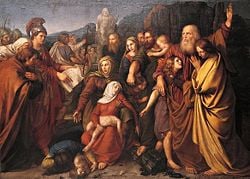Maccabees
- This article is about the Maccabee rebels. For other uses, see Maccabees (disambiguation).
The Maccabees (Hebrew: מכבים or מקבים, Makabim) were Jewish rebels who fought against the rule of Antiochus IV Epiphanes of the Hellenistic Seleucid dynasty, who was succeeded by his infant son Antiochus V Eupator. The Maccabees founded the Hasmonean royal dynasty and established Jewish independence in the Land of Israel for about one hundred years, from 165 B.C.E. to 63. Their defeat of a much larger power was a remarkable feat. Israel had not known self-governance since 587B.C.E. The Hasmoneans succeeded in winning back a considerable portion of Solomon's old empire. Like David before them, they consolidated their power by centralizing authority in Jerualem and combining the office of king and High Priest. This attracted criticism from some because the Hasmonean's were not descended from Moses' brother, Aaron the first High Priest and from others, especially the Pharisees because they exercised both religious and political authority. The Pharisees favored separation. The Hasmoneans tied to purify Judaism of what they saw as corrupt elements, destroying the Samaritan Temple on Mount Gerizim. However, they favored assimilation of Greek culture which was opposed by groups such as the Essenes, who withdrew to the Dead Sea region where they established a rival Temple, priesthood and community of the pure. The dynasty's downfall was caused by rivalry within the family and by the arrival of the Romans. In 63B.C.E. Pompey brought Israel, generally known as Palestine, under Roman jurisdiction and in 37B.C.E. the Romans supported Herod the Great's usurption of power.
The revolt
In 167 B.C.E., after Antiochus issued decrees in Judea forbidding Jewish religious practice, a rural Jewish priest from Modiin, Mattathias the Hasmonean, sparked the revolt against the Seleucid empire by refusing to worship the Greek gods and slaying the Hellenistic Jew who stepped forward to worship an idol. He and his five sons fled to the wilderness of Judea. After Mattathias' death about one year later, his son Judah Maccabee led an army of Jewish dissidents to victory over the Seleucids. The term Maccabees as used to describe the Judean's army is taken from its actual use as Judah's surname.
The revolt itself involved many individual battles, in which the Maccabean forces gained infamy among the Syrian army for their use of guerrilla tactics. After the victory, the Maccabees entered Jerusalem in triumph and religiously cleansed the Temple, reestablishing traditional Jewish worship there.
Following the re-dedication of the temple, the Maccabees supporters were divided over the question of whether to continue fighting. When the revolt began under the leadership of Mattathias, it was seen as a war for religious freedom to end the oppression of the Seleucids; however, as Maccabees realized how successful they had been many wanted to continue the revolt as a war of national self-determination. This conflict led to the exacerbation of the divide between the Pharisees and Saducees under later Hasmonean monarchs such as Alexander Jannaeus. [1]
Every year Jews celebrate Hanukkah in commemoration of Judah Maccabee's victory over the Seleucids and subsequent miracles.
Mention in Deuterocanon
The story of the Maccabees can be found in the Hebrew Bible in the deuterocanonical books of 1 Maccabees and 2 Maccabees. Books of 3 Maccabees and 4 Maccabees are not directly related to the Maccabees.
Origin of name
The name "Maccabee" is sometimes seen used as synonym for the entire Hasmonean Dynasty, but the Maccabees proper were Judah Maccabee and his four brothers. The name Maccabee was a personal epithet of Judah, and the later generations were not his descendants. Although there is no definitive explanation of what the term means, one suggestion is that the name derives from the Aramaic maqqaba, "the hammer", in recognition of his ferocity in battle. It is also possible that the name Maccabee is an acronym for the Torah verse Mi kamokha ba'elim YHWH, "Who is like unto thee among the mighty, O Lord!" (Exodus 15:11).
Notes
- ↑ 'see Cohen, Shaye J.D
External links
- Etymology of "Maccabee" Retrieved August 16, 2007.
- TALES OF ARABESQUE HELLENISME Retrieved August 16, 2007.
- Jewish Encyclopedia: Maccabees, The Retrieved August 16, 2007.
Credits
New World Encyclopedia writers and editors rewrote and completed the Wikipedia article in accordance with New World Encyclopedia standards. This article abides by terms of the Creative Commons CC-by-sa 3.0 License (CC-by-sa), which may be used and disseminated with proper attribution. Credit is due under the terms of this license that can reference both the New World Encyclopedia contributors and the selfless volunteer contributors of the Wikimedia Foundation. To cite this article click here for a list of acceptable citing formats.The history of earlier contributions by wikipedians is accessible to researchers here:
The history of this article since it was imported to New World Encyclopedia:
Note: Some restrictions may apply to use of individual images which are separately licensed.
